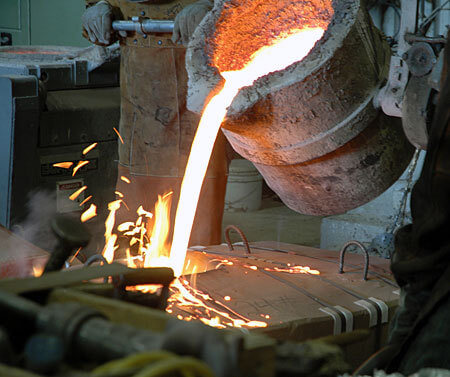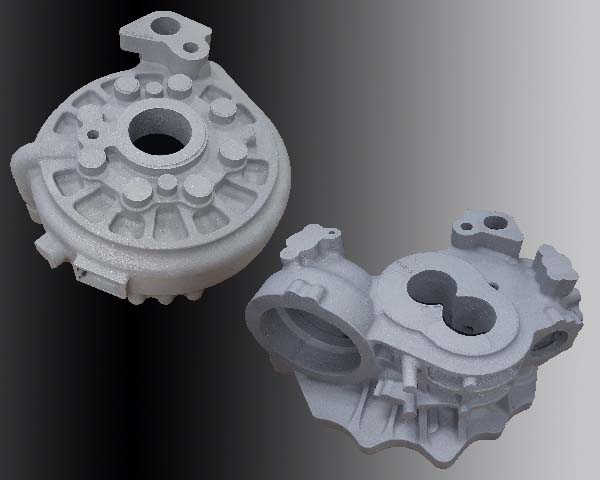Aluminum Casting Company services that support industrial operations
Wiki Article
Checking out the Duty of Foundry Solutions beforehand Modern Engineering Solutions
Factory solutions are necessary fit contemporary design solutions - Aluminum Foundry. They link the void in between conventional manufacturing techniques and the demands of modern industries. With innovations in automation and sustainability, factories are advancing to meet the needs of fields such as aerospace and automobile. This improvement questions about the ramifications for materials, processes, and future developments. What obstacles and chances lie ahead for foundry services in this swiftly transforming landscape?The Evolution of Factory Solutions in Design

The assimilation of computer-aided design (CAD) and simulation software application has actually transformed the style and manufacturing processes, making it possible for foundries to create intricate geometries with higher accuracy. In addition, the shift towards eco-friendly techniques has actually led to the adoption of greener innovations and reusing initiatives within foundries. As markets significantly focus on personalization and rapid prototyping, factory services have expanded their capabilities, guaranteeing they continue to be important contributors to the engineering landscape. This development emphasizes the shop's critical role in supporting improvements throughout different industries, including automobile, aerospace, and power.
Trick Procedures and Strategies in Modern Foundries
Modern shops use a variety of key processes and strategies that boost the performance and quality of metal spreading. Among these, sand spreading continues to be prevalent due to its versatility and cost-effectiveness. The use of innovative technologies, such as computer-aided style (CAD) and computer-aided manufacturing (WEB CAM), permits for accurate modeling and production, ensuring high precision in component measurements. Furthermore, financial investment casting is preferred for creating intricate geometries with superb surface finishes.Automation and robotics boost manufacturing rate and consistency while minimizing labor costs. Strategies like additive manufacturing are progressively incorporated to create intricate mold and mildews and cores, thus minimizing product waste. The application of thermal evaluation aids in enhancing casting processes by managing and predicting solidification behavior. Jointly, these techniques and procedures exhibit how modern-day factories are adjusting to satisfy the needs of contemporary design obstacles, making sure superior item quality and operational performance.
The Importance of Materials Choice in Factory Providers
Picking the appropriate materials is important in shop solutions, as it straight affects the mechanical residential properties, toughness, and total performance of the final item. Various materials have one-of-a-kind features, such as tensile strength, rust resistance, and thermal stability, which must straighten with the designated application of the actors components. Steels like light weight aluminum and steel are often selected for their strength-to-weight proportion, while alloys can boost specific efficiency attributes.Moreover, the choice process involves considering variables such as cost, schedule, and manufacturability, which can significantly affect task timelines and budget plans. In addition, improvements in product scientific research make it possible for the advancement of ingenious compounds and specialized alloys that accommodate arising engineering challenges. A complete understanding of material residential or commercial properties and their implications is essential for designers and foundry specialists to accomplish effective results in their tasks. This careful choice procedure ultimately boosts the integrity and efficiency of completion products.
Shop Services in Aerospace and Automotive Applications
Factory solutions play an essential role in the aerospace and vehicle industries, where precision and efficiency are critical. These sectors depend heavily on the production of complex parts that should meet extensive top quality criteria and endure extreme problems. Foundries provide essential services such as casting, machining, and completing, making certain components are light-weight yet robust, important for enhancing gas efficiency and safety and security.In aerospace, factory solutions add to the manufacturing of turbine blades, engine elements, and architectural components, all of which demand high-performance materials and detailed styles. In the redirected here automobile market, foundries supply engine blocks, chassis elements, and transmission situations, concentrating on longevity and weight decrease.
Advanced factory techniques, consisting of additive production and accuracy casting, are increasingly employed to fulfill the particular needs of these sectors. By supplying tailored remedies, foundry solutions assist drive advancement and maintain competitive advantages in the fast-evolving aerospace and vehicle landscapes.
Innovations Driven by Foundry Capabilities
Various advancements in engineering are sustained by the sophisticated capabilities of factory solutions. These services make it possible for the manufacturing of intricate geometries and high-performance materials that are vital for contemporary applications. Additive manufacturing, commonly recognized as 3D printing, has actually seen substantial improvements through shop techniques, allowing for the quick prototyping of intricate styles. In addition, the ability to cast light-weight alloys has revolutionized sectors such as aerospace and automotive, causing enhanced gas effectiveness and efficiency.Shops are increasingly incorporating clever technologies, such as automation and data analytics, to improve manufacturing effectiveness and top quality control. These advancements not just reduce waste yet additionally enable customization at scale, meeting the details requirements of customers. By leveraging innovative foundry capacities, engineers can check out brand-new frontiers in product design and functionality, ultimately driving progress across numerous markets and developing a foundation for future advancements.
Future Patterns in Foundry Solutions and Design Solutions
The future of shop services is formed by emerging fads such as sustainable production methods, which focus on ecological duty. Automation and smart innovations are set to boost performance and accuracy, while raising customization and versatility will certainly satisfy the developing demands of customers. As these trends evolve, they will redefine the landscape of engineering solutions in the shop market.
Lasting Manufacturing Practices
As industries significantly prioritize ecological duty, sustainable production methods within foundry solutions are becoming vital to modern engineering services. These practices concentrate on lessening waste, decreasing energy intake, and making use of eco-friendly products throughout the production procedure. By executing strategies such as reusing scrap metal and maximizing melting processes, shops can especially lower their carbon footprint. In addition, the adoption of life process analyses enables manufacturers to examine the ecological influence of their products from beginning to disposal. Working together with suppliers dedicated to sustainability additionally boosts the efficiency of these initiatives. Inevitably, welcoming lasting manufacturing not only aligns with worldwide ecological objectives however additionally fosters advancement additional resources and competition in the rapidly evolving design landscape.Automation and Smart Technologies
While many markets are embracing technological advancements, factory services are experiencing a substantial makeover with automation and wise modern technologies. The integration of robotics and automated systems enhances production efficiency, decreases human mistake, and increases the manufacturing procedure. Smart modern technologies, such as IoT and AI, make it possible for real-time tracking and predictive maintenance, which optimize operational efficiency and minimize downtime. These advancements help with data-driven decision-making, allowing shops to respond promptly to market needs and boost product quality. In addition, automation decreases labor prices and improves office safety and security by handling unsafe tasks. As factory services remain to take on these innovations, they are poised to redefine engineering options, causing raised competitiveness and sustainability in the manufacturing industry.Personalization and Adaptability Trends
Emerging fads in factory solutions increasingly emphasize customization and versatility to meet special customer needs. This change reflects a broader demand for customized engineering options that adapt to specific task needs and sector criteria. Firms are buying advanced modern technologies, such as additive manufacturing and electronic modeling, enabling them to produce customized elements efficiently and cost-effectively. Therefore, factories are relocating away from one-size-fits-all strategies, using clients the capacity to change layouts and materials in real-time. Additionally, cooperation in between engineering teams and shop solutions is ending up being more incorporated, promoting technology and speeding up time-to-market. This fad not only enhances item performance but additionally supports sustainability by minimizing waste with specific manufacturing procedures.Often Asked Concerns
What Are the Regular Expenses Linked With Shop Providers?
Common prices connected with factory services include material costs, labor fees, tools usage charges, and overhead costs - Aluminum Foundry. These expenses can vary widely based on project complexity, volume, and certain needs of the engineering remedy involvedThe length of time Does the Factory Refine Normally Take?
The foundry process generally takes anywhere from a number of weeks to a couple of months, depending upon factors such as complexity, product needs, and manufacturing quantity, which can considerably influence timelines and total project delivery.What Industries Benefit Most From Foundry Services?
Industries such as automobile, aerospace, and building advantage significantly from factory services. These markets depend on look at this site accuracy spreading and metal fabrication to produce complicated elements, enhancing product efficiency and functional performance in their respective applications.What Qualifications Should Shops Have?
Foundries must have certifications such as ISO 9001 for high quality management, ISO 14001 for ecological administration, and specific industry qualifications like AS9100 for aerospace or IATF 16949 for auto, making sure conformity and quality control.How Do Foundries Make Sure Quality Assurance in Their Procedures?

Foundry solutions are necessary in forming contemporary engineering remedies. As design disciplines have progressed, the role of shop services has actually changed significantly to meet developing market needs. As sectors increasingly prioritize modification and rapid prototyping, foundry services have broadened their abilities, guaranteeing they continue to be essential contributors to the engineering landscape. As industries increasingly prioritize environmental obligation, sustainable manufacturing practices within factory solutions are coming to be essential to modern engineering services. In addition, collaboration between design teams and foundry solutions is becoming a lot more integrated, fostering advancement and accelerating time-to-market.
Report this wiki page